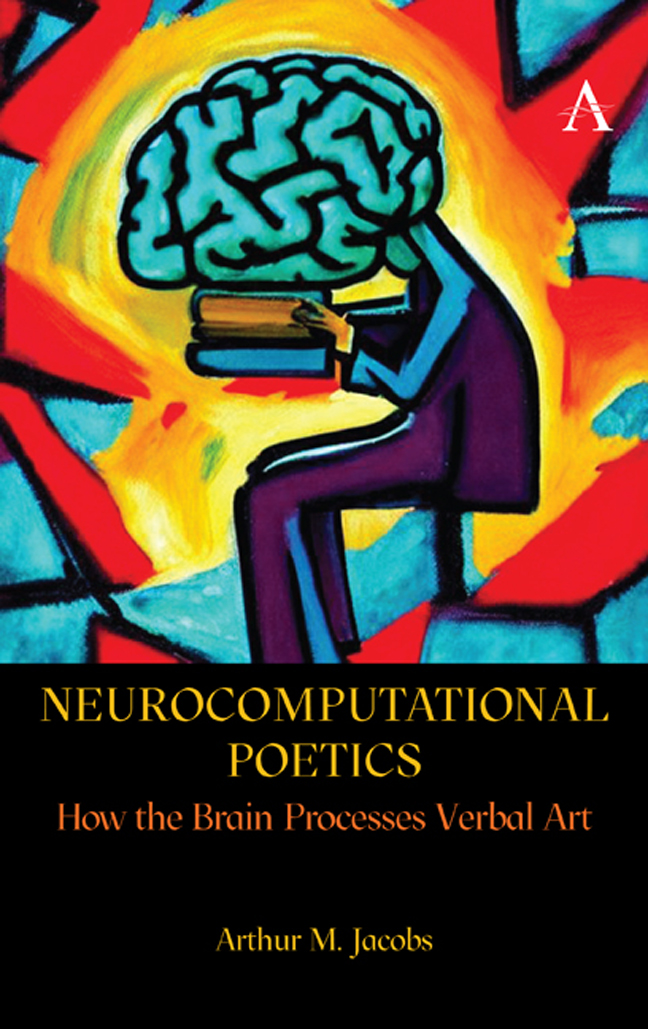Book contents
- Frontmatter
- Contents
- Acknowledgements
- Dedication
- Preface
- 1 Introduction: The Two Boons of an Unnatural Daily Activity
- 2 Models and Methods
- 3 Text Analysis
- 4 Reader and Reading Act Analysis
- 5 Computational Poetics I: Simple Applications
- 6 Computational Poetics II: Sophisticated Applications
- 7 Neurocomputational Poetics I: Upper Route Studies
- 8 Neurocomputational Poetics II: Lower Route Studies
- 9 Conclusions
- References
- Index
4 - Reader and Reading Act Analysis
Published online by Cambridge University Press: 01 March 2024
- Frontmatter
- Contents
- Acknowledgements
- Dedication
- Preface
- 1 Introduction: The Two Boons of an Unnatural Daily Activity
- 2 Models and Methods
- 3 Text Analysis
- 4 Reader and Reading Act Analysis
- 5 Computational Poetics I: Simple Applications
- 6 Computational Poetics II: Sophisticated Applications
- 7 Neurocomputational Poetics I: Upper Route Studies
- 8 Neurocomputational Poetics II: Lower Route Studies
- 9 Conclusions
- References
- Index
Summary
As sketched in the metamodel of Chapter 2, literary experiences result from the dynamic interaction between author, (con-)text and reader. Neurocomputational Poetics focusses on text and reader because these can best be characterized by quantifiable features. In the previous chapter on text analysis, I presented methods for computing text features that, according to the NCPM, can bias a reader's mind more towards the upper or the lower route of processing. This bias can be induced globally by the choice of a novel instead of a poetry collection, for example, or locally when re-reading a section of a text to reflect upon its form or content. In this chapter, I deal with both the reader and the act of reading. The ‘reading motivation and mode’ box of the mesomodel in Chapter 2 brings a number of reader-related factors into play that also influence this bias towards one of the two routes. Among those are stable personality variables called ‘traits’ or more transient, local aspects like spontaneous mood management called ‘states’ in personality psychology. Here, I discuss methods for analyzing these in Neurocomputational Poetics studies.
Reader Analysis
Most empirical studies of literature and reading psychology focus on the ‘average reader’: a purely statistical creature typically represented by mean values averaged across the data from some rather small (N∼20) and generally non-representative sample. Indeed, the large majority of empirical studies on reading so far have used undergraduate psychology students. When examining the processing of non-literary, short expository texts – so-called textoids – typical for these studies, the distortion in the data produced by this overselective sampling method may not be as detrimental as when studying the reception of verbal art. But even if the error introduced by this sampling method were negligible, reading ultimately remains a solitary, subjective and private act. It goes without saying that readers have different cultural and social backgrounds, education, habits, skills, personalities and preferences. And all these produce variables that contribute to the reading act and can be more or less well assessed. Luckily, psychology also offers methods to study readers’ reading skills, personalities or interests, and these provide useful data when trying to predict the outcome of a reading act via models like the NCPM. Indeed, empirical studies have shown that reading can change both personality states and traits, and these, in turn, can change the way texts are read and appreciated.
- Type
- Chapter
- Information
- Neurocomputational PoeticsHow the Brain Processes Verbal Art, pp. 87 - 112Publisher: Anthem PressPrint publication year: 2023

